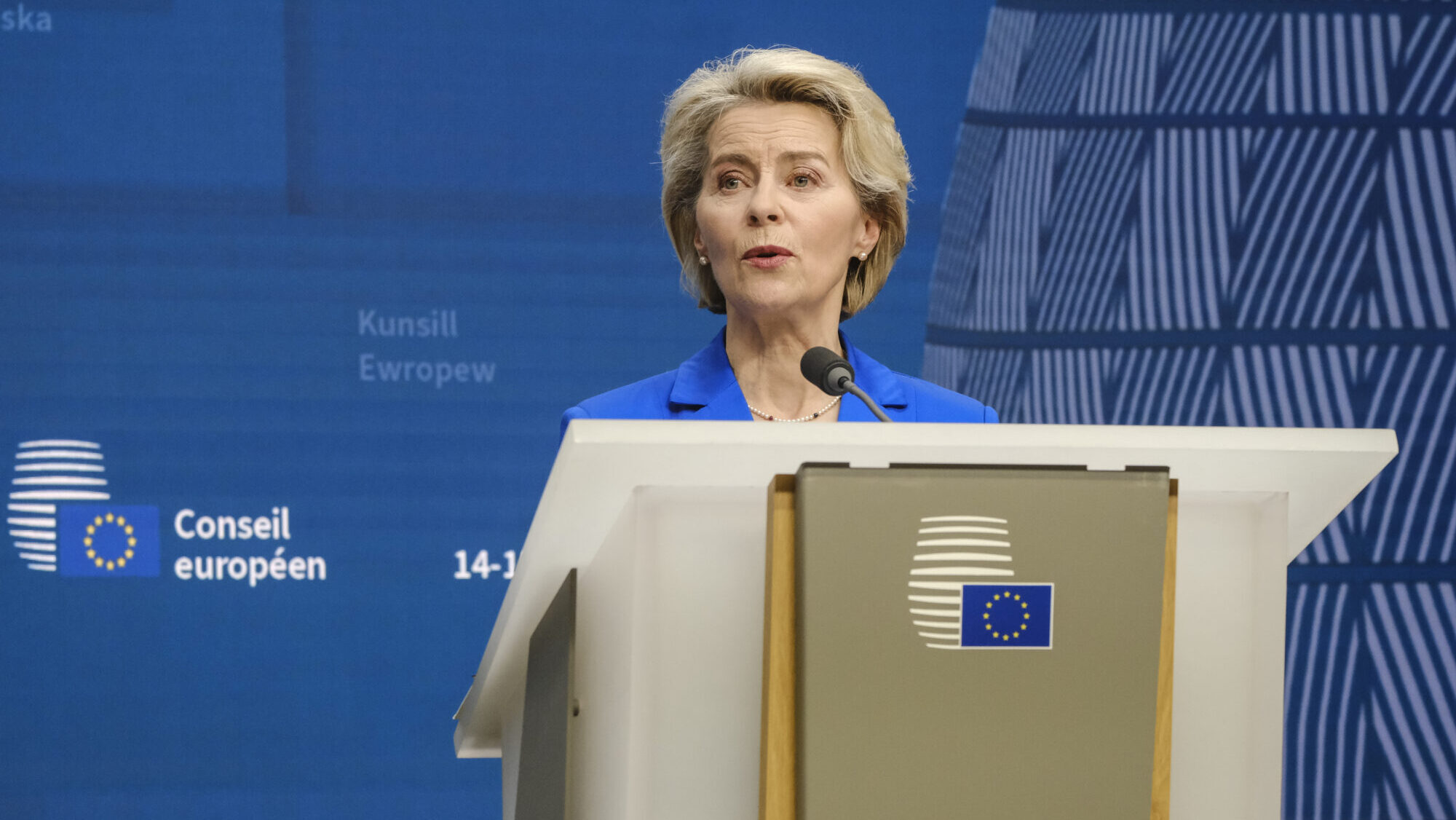
Commission Chief Ursula von der Leyen after the EU Council Summit on December 15th.
Photo: © European Union
The second day of this week’s European Council Summit concluded on Friday, December 15th, but—as opposed to the quite hectic first day—there was no real breakthrough on any of the issues on the agenda, including the Migration Pact, Romania and Bulgaria’s Schengen accession, or finding a unified position on the Israeli conflict.
Regarding the €50 billion military assistance to Ukraine, however, EU leaders—including von der Leyen—have begun cautiously toying with the idea of somehow bypassing Hungary’s veto again, although no one is sure how to do it or if it is even possible.
Leaders are already gearing up for January’s extraordinary Council meeting that was agreed on yesterday for the sole purpose of returning on the issue of the €50 billion extra funds for Ukraine, which—as part of the wider budget top-up proposal—was a tricky issue to get everyone to agree on.
As both Council President Charles Michel and Commission chief Ursula von der Leyen said, this Summit was not entirely fruitless in this regard either. The leaders managed to tweak the proposal until nearly all member states found it acceptable. The new agreement includes “redeployment and reprioritization” of existing funds along with the proposed budget top-up, so all but one member state—Hungary—approved in the end.
The possibility of Hungary’s PM Orbán vetoing the package during the next Summit still looms over the Council, but there could be “workarounds,” some suggested.
“It’s possible for the 26 member states to provide the money on a bilateral basis — not through the [EU budget] … there are workarounds,” Irish PM Leo Varadkar said in his doorstep interview Friday morning.
He then warned that what happened the previous day should not be repeated or abused, as setting a precedent could weaken all member states, saying that proceeding without unanimity “is not where we want to be.”
For her part, von der Leyen agreed but did not exclude using loopholes again.
“We are working very hard to have an agreement with 27 member states, but it is also necessary to work on an operational solution in case an agreement by 27, so unanimity, is not possible,” the Commission chief said.
In the eyes of Budapest, the obvious solution is releasing the entirety of Hungary’s EU funds that the Commission froze years ago over certain rule of law concerns, which Budapest says have all been addressed since.
Given that both issues are financial and pertain to the EU budget, the questions of Hungary’s frozen funds and Ukraine’s long-term assistance are “directly linked,” said the Hungarian prime minister’s political director, Balázs Orbán, ahead of Friday’s meeting.
“We think that we fulfilled all the legal requirements so we don’t understand why we don’t have access to 100% of the money,” Balázs Orbán explained, adding that since it’s inherently part of the budget discussions, Hungary was “open to negotiate.”
The semantic battle over the Israeli conflict continued, and the day began with the four most pro-Palestinian countries—Spain, Belgium, Ireland, and Malta—asking for a step up in EU communication and swapping the previously agreed phrasing of “humanitarian pauses” for something more resembling an actual ceasefire.
The humanitarian situation has worsened significantly since the last Summit two months ago, Belgian PM Alexander De Croo said, adding that officially asking Israel for “maximum restraint” and calling for “lasting complete humanitarian access” should be included in the joint position.
In the end, the more pro-Israel countries—such as Germany, Austria, and the Czech Republic—refused to get on board, and the Summit ended without a conclusion on Gaza. Just like in the case of the extra funds for Ukraine, the leaders only agreed to return to the issue another time.
However, the Council remains committed to its support for the two-state solution and will continue to work on subsequent peace proposals, Council President Charles Michel added during the post-Summit press conference.
After waiting for over a decade to finally be part of the Schengen area, Romania and Bulgaria hoped this Summit would finally give them the green light. Nearly all member states agree the countries are ready to join the free movement zone, but not all. No, this time it’s not Hungary: Bulgaria’s Schengen accession is vetoed by the Netherlands, while Austria blocks both Bulgaria and Romania from joining.
Suspecting that the Dutch would come around easily if they were to remain alone in opposition, Bulgarian MEP Nikolai Denkov and Romanian President Klaus Iohannis teamed up with von der Leyen late last night to approach Austrian Chancellor Karl Nehammer in a last-minute bid to try to persuade him into dropping the veto on Friday.
Vienna already floated that it might be ready for a compromise: allow passport-free air travel only while keeping the land borders closed. However, given that the vast majority of residents in these two countries make their trips abroad using cars or buses, this would not be much of a solution for Sofia and Bucharest.
“We explained that land borders for us are important and made a suggestion for how we could go forward,” Denkov said, but admitted that the potential breakthrough has to wait for “a follow-up discussion.”
Despite being one of the major points on the agenda, the debate about finalizing the Migration Pact—and coming to an agreement on the controversial “mandatory solidarity” instrument—began only at the very end of the Summit.
But as the leaders were exhausted after two long days of negotiations, the discussion was cut short without any meaningful results. Von der Leyen remains hopeful that the EU will complete the Migration Pact “by the end of the year,” meaning in next week’s ministerial meetings.
However, a Summit decision will still be needed to make the package official, which means the pressure to get the job done in the next couple of months will be enormous on the incoming Belgian presidency, as June’s EU elections could put the entire package in a legislative deadlock.
